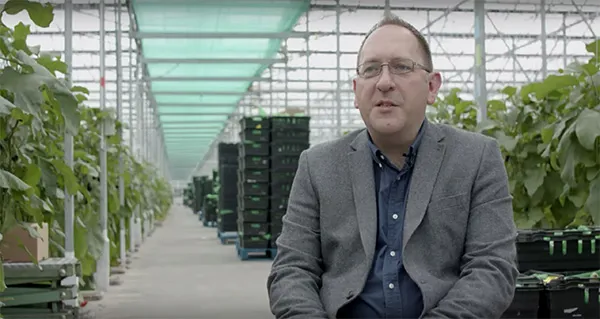Whereas UK citizens are hoarding groceries due to the more strict lock-down that came into effect this week, it is growers who are currently paying the price. The demand skyrockets, but so do the labor and transport costs and currently they’re not able to pass these on because the prices are set. “We have to make sure the production of fresh fruits and vegetables keeps on going in this situation, but if you can’t make it work economically, growers will not do it anymore”, says Lee Stiles with Lea Valley Growers.

Look after your suppliers
“It’s not the growers filling their boots at the moment. Supermarkets look after your suppliers!” This is part of a tweet from Lee Stiles with Lea Valley Growers. Lea Valley Growers is one of the largest horticultural concentrations in the UK. Every year, 500 million cucumbers and sweet salad peppers are grown, along with tomatoes, aubergines, lettuce, herbs, flowers, trees, shrubs, aquatic and bedding plants, on about 350 acres of glasshouse in the regions of London, Essex, Hertfordshire, Middlesex, Cambridgeshire and Yorkshire. Currently they are dealing with lower margins on their produce – which is strange since the demand in the UK is on a peak. “The input costs are going up – growers can only sustain for so long with these lower margins.”
“The lockdown in the UK is more strict this week than it was before. The last few weeks the vast majority of the population was panic shopping and there were shortages in the supermarkets. Now everybody tries to catch up”, Lee explains. “Supermarkets are increasing orders. They can put in 50-100% more orders, but you have to be realistic how it will work.”
Transport costs up £2,000 per trip, the £ down 10%, workers going sick, overtime payments up, no increase in price from supermarkets whose profits are through the roof, it’s not the Growers filling their boots, Supermarkets look after your suppliers! #COVIDー19 #coronavirus pic.twitter.com/XQ2Egl1H1j
— Lea Valley Growers (@LeaValleyGrower) March 24, 2020
Rising costs
Part of the rising costs are the rising labor costs UK growers have to deal with. Due to Brexit, labor has been an issue for quite some time now and this was supposed to be the final transitioning year – something that is disturbed because of the movement restrictions. In addition these days UK growers are looking to increase their workforce as they are coming to full production. “Many workers normally come from Europe, over 95% of them. We can’t rely on anyone coming over to help.”
Growers can not just go out and recruit and train thousands more workers in a short period of time so this will have a knocking effect on the industry. “They can only do so much. The workers could become ill at anytime in common with everyone else, and the British workforce is unwilling to do these jobs. I’ve only received 2 applications from British workers since the outbreak began so we’re not exactly overwhelmed with applications at the moment – even if you think of all the people in need of a job right now. We need 2500 people in Lea Valley.” UK farmers with field crops are struggling for labour even more, a lot of the workers that are here really want to go home and see their family. “Which is totally understandable, of course, but the labour shortage is a big concern.”
Transport costs
Secondly in these weeks also the transport costs are rising, especially the Spanish. These affect the UK companies because they often import from Spain to complete the year round season. “Spanish drivers did not want to make the trip because they were uncertain if they would be able to get back again. Also there is not much backload to Spain, empty lorries on the way back are charged for.”
Summarizing, the additional costs are rising, and at the end of the day they have to be passed on to the retailer and the consumer – but that’s not what’s happening right now. The UK product prices are set for most growers, 3-4 months before the year starts. “Many companies have, over the last years, made a lot of money at the expense of the producers”, Lee says.
“Hopefully this issue will make readjustments to people's thinking. All parts of the chain should share in the overall profit. But from what I’m hearing, there’s not much movement in them since the COVID-19 outbreak occurred. It’s a good business for supermarkets right now. We want to ask them, please be mindful of your suppliers," Lee says.
“Nowadays a grower might as well cut orders down to current staff level and make a saving that way. The days of trying to keep up with the orders are gone. It highlights how cheap produce has become, and how undervalued. If they can’t make it work economically, growers can’t do it anymore. There is no point in losing money if the retailers are not going to support you. Yet there is one thing that will help people: building up an immune system and maintaining a healthy diet. So we have to make sure that the production of fresh fruits and vegetables keeps going in this situation.”
For more information: Lea Valley Growers Association
Lea Valley Growers Association
www.lvga.co.uk
